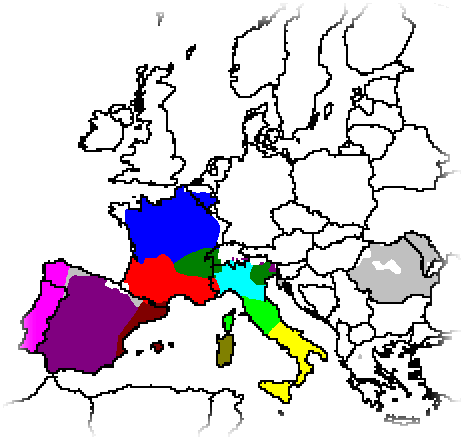Comparison of Romance Languages - An Overview
The scope of this page is to briefly present the major Romance languages.
Galician
Galician is spoken in Galicia (NW of Spain) by an overwhelming majority of the population.
It is very similar to Portuguese, to the point that many linguists consider them as one language.
Portuguese
Portuguese is the national tongue of Portugal. It is also spoken in former Portuguese colonies,
especially Brazil.
Asturian
aka Bable, Asturo-Leonese, Mirandese or Estremenh. A collection of dialects spoken in Asturias, in the NW of Leon,
and in the district of Miranda in Portugal in a position of diglossia with regard to Spanish (in Spain)
or Portuguese (in Portugal).
Spanish
Spanish is the national tongue of Spain. It is also spoken in former Spanish colonies, especially
Latin America. In Spain, the language is often referred to as Castillan, because Spain recognises
four other languages: Basque, Catalan, Galician and Aranese (see Occitan below).
Aragonese
aka Fabla. A language at the crossroads between Ibero-Romance and Gallo-Romance, spoken by about
50,000 people in rural areas of Aragón, in a position of diglossia with regard to Spanish.
Catalan
Catalan is the language of Catalonia, Valencia and the Balearics. It is especially lively in Catalonia,
where it is the language of everyday life.
Occitan
Occitan was the very first written Romance language. It was also somewhat the equivalent of today's
English in the Middle Ages, the language of troubadours (rock stars of the time), courts, and
scholars. Unfortunately, the French crusade against the Albigensians ruined Occitania, destroyed
Occitan civilisation, and was the beginning of a long decline in the use of the language.
Occitan is spoken from the Val d'Aran in Spain to the Alpine valleys of Piedmont, through all of what is today
called Southern France. In the Val d'Aran, Occitan (called Aranese) is co-official along with Catalan and Spanish and spoken by
an overwhelming majority of the population. In Piedmont, the language has attained official status only in 1999, but is still widely spoken.
In Southern France, the language is in a situation of diglossia with regard to French and is only spoken by about
a sixth of the population on a regular basis. Article 2 of the French Constitution forbids the use of any
other laguage than French in public, so the situation looks bleak indeed.
French
French is the national tongue of France, and one of the national tongues of Belgium, Switzerland and Canada.
It also has official status and is widely spoken in Luxembourg and in the Italian autonomous region of Valle d'Aosta.
French is also somewhat spoken in former French colonies.
Franco-Provençal
aka Arpitan. A collection of dialects spoken in the NW of the Alps (France, Switzerland, Italy) in a position
of diglossia with regard to French or even Piedmontese (in Italy).
North Western Italian Dialects
Piedmontese, Milanese, Ligurian, Emilian are the main NW Italian dialects. They are widely spoken in their
respective regions but have no official status whatsoever in spite of their vitality.
Venetian
Venetian is at the crossroads between Alpine Romance dialects and Italian. It is widely spoken in
Venetia and used to be spoken in Istria and Dalmatia before World War II.
Romansh/Friulan
The three main dialects known as Romansh, Dolomitic Ladin and Friulan make up the language known,
as a whole, as Rhaeto-Romance. Romansh is recognised as one
of the national tongues of Switzerland. Dolomitic Ladin is spoken by a minority in the Italian region of Trentino-Alto Adige
and is recognised by both regional and national laws. Friulan has more speakers than Romansh or Dolomitic Ladin, yet it has
but recently (1999) gained official recognition.
Italian
Italian is the national tongue of Italy, and one of the national tongues of Switzerland.
It was developed as a literary language from the Central Italian dialect of Tuscany but became a spoken language after Italian
unification at the end of the 19th century.
Neapolitan/Sicilian
These are the main Southern Italian dialects. They are widely spoken in their
respective regions but have no official status whatsoever in spite of their vitality.
Sardinian
It is considered in Italy as the 'dialect' of Sardinia, yet it is a fully independent language.
It has only attained official status in 1999.
Like all minorised languages, it is split in several dialects.
Dalmatian
Extinct language that used to be spoken in Dalmatia.
Istrian
aka Istro-Roumanian. Almost-extinct language still somewhat spoken in Istria in a position of diglossia with regard
to Croatian.
Roumanian
Roumanian is the national tongue of Roumania and Moldavia (former Soviet republic). It had heavy
Slavic influences until the 19th century when it was "re-latinised" with plenty of French loan words.
Moldavian
Moldavian is the same language as Roumanian. It evolved somewhat differently because of Russian influence.
Aroumanian
aka Macedo-Roumanian, Vlach. Spoken by some nomad shepherds in Greek Macedonia.
Megleno-Roumanian
Spoken by some nomad shepherds in Macedonia (former Yugoslav republic).
For lack of space, only the languages written in black are dealt with in this site.

| Colour | Language |
|---|
| | Portuguese/Galician |
| | Spanish |
| (in Northern Spain) | Asturian |
| | Occitan |
| | Catalan |
| (in Eastern Spain) | Aragonese |
| | French |
| | Franco-Provençal |
| | North Western Italian Dialects |
| | Rhaeto-Romance |
| | Venetian |
| (in Croatia) | Istrian |
| | Sardinian |
| | Central Italian Dialects |
| | Neapolitan/Sicilian |
| (in Greece) | Aroumanian |
| (in Roumania and Moldavia) | Roumanian/Moldavian |
Reference:
- La langue occitane, Pierre Bec, Presses Universitaires de France, 1995 (6me éd. corr.)
- Osnovy balkanskovo Jazykoznanija, Časť I, Leningradskoe Otdelenie, 1990
- Des langues romanes, JM Klinkenberg, Duculot, 1999 (2me éd.)
- The Romance languages, M. Harris & N. Vincent, ed., Oxford University Press, 1988, 1990
